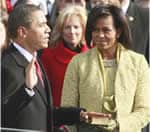 |
|
Barack Obama takes the oath of office during the inauguration ceremony |
While FDR’s fireside chats were reassuring to the American people, Obama is facing a very different world, where terrorist threats and Blackberries have created a new sense of urgency. The world is interconnected as never before, and events are happening at a much more rapid pace. Obama needs to capture the imagination of the people in his first 100 days. Perhaps this will come through the creation of a new Apollo project to find a renewable source of energy that is cheap and green. Or maybe Obama and his team will find a way to solve the housing market crisis and protect the value of the biggest asset for most Americans. Helping the middle class and small businesses are other possibilities for restoring the country’s confidence—and keeping electoral promises.
While pressing issues, including healthcare, education costs and the struggling automobile industry, vie for attention at home, the biggest problems—and opportunities—may lie outside of America’s borders. The first thing the Obama administration could do on the international stage wouldn’t cost it a penny. It could simply make a straightforward declaration of the value of a strong dollar. Lawrence Summers, the incoming director of the National Economic Council, was one of the original advocates of a strong-dollar policy. With trillion-dollar deficits for years to come as a result of the bailouts and economic stimulus programs already in the works, the United States will be overly dependent on capital inflows. That capital won’t keep coming to America if the dollar tanks.
For the near term, the dollar is likely to be supported by the eagerness of foreign investors to purchase US assets at bargain-basement prices in anticipation of an economic rebound. Unfortunately, no one can predict with certainty when the economy will recover. If the recession is longer and deeper than predicted, all bets are off. During the election campaign, Obama pointed out that a weak dollar boosts US exports by making them more competitive in global markets. He also noted, however, that a falling dollar raises the cost of imports. The way to strengthen the dollar, he suggested, is to strengthen the economy.
Tautologies aside, the US has a fleeting opportunity to take the high ground. If it waits until long-term interest rates rise to talk up the dollar, it may be too late. The bursting of the bond market bubble in the onslaught of new borrowing could make the subprime mortgage crisis seem tame by comparison.
When the United States prospers, so do its trading partners. Obama may seek to reopen free trade agreements that do not include labor and environmental protections. He needs to be careful, however, not to cross the thin line into protectionism. The whole world is watching.



